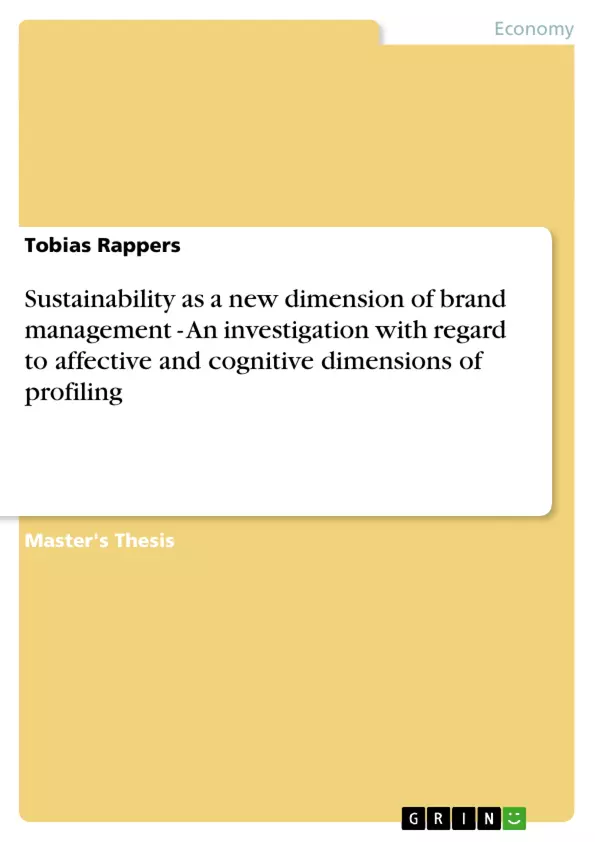Paper ist in Englisch +++ Thesis is in English +++
Das Konzept der Nachhaltigkeit wurde vor vielen Jahren in der Disziplin des Marketingmanagements vorgestellt und hat seinen Ursprung in den Bereichen des Öko-Marketings und Umweltmanagements. Während die Konzepte seit den neunziger Jahren an Bedeutung verloren, wurden die Ansätze und die Ideologie vom ganzheitlichen Konzept der Nachhaltigkeit aufgenommen, das heute sowohl die ökologische, soziale als auch ökonomische Perspektive vereint.
Globale Krisen, Wirtschaftsskandale, und durch Unternehmen verursachte Umweltkatastrophen, kombiniert mit der Furcht vor dem Klimawandel und schwindenden Ressourcen, stärkt den Wunsch der Gesellschaft nach verantwortungsvolleren und nachhaltigeren Lösungen.
Die Gesellschaft und die Politik sehen zunehmend Unternehmen in der Verantwortung einen erheblichen Beitrag zur Nachhaltigkeitsentwicklung zu leisten. Gleichzeitig ist es ein Kernziel von Unternehmen Nachhaltigkeitsziele innerhalb der Unternehmung zu verankern, um die Stabilität der Märkte zu fördern und soziale sowie ökologische Probleme zu vermeiden. Eine systematische Nachhaltigkeitsorientierung sowie deren Integration in die Unternehmensmarke kann so zu einem Wettbewerbsvorteil führen, der bereits durch die Wissenschaft aufgezeigt und durch die Praxis bestätigt wurde. Konzeptionelle Ausführungen und empirische Untersuchungen zur effektiven Profilierung von Nachhaltigkeitsmarken sind in der Wissenschaft und Praxis jedoch kaum zu finden, obwohl das Thema aufgrund einer sensibleren und emanzipierteren Gesellschaft an Bedeutung gewinnt.
Die vorliegende Master-Arbeit bietet Unternehmen daher einen systematischen Ansatz zum Aufbau, Management und Kommunikation von Nachhaltigkeitsmarken. Anlehnend an bekannte Konzepte des Markenmanagements werden die Markenidentität und das Markenimage besonders berücksichtigt.
[...]
Der konzeptionellen Ansatz dieser Master-Arbeit hilft dem Top-Management den Aspekt der Nachhaltigkeit strategisch und kontrolliert in die Unternehmensmarke zu integrieren. Der empirische Teil hingegen, unterstützt Brand Manager und Werbeagenturen dabei das Nachhaltigkeitsimage effektiv und glaubwürdig aufzubauen.
Inhaltsverzeichnis (Table of Contents)
- Introduction
- The increased attractiveness of sustainability branding in times of uncertainty, globalization and crisis
- Definition of relevant terminology
- Objectives and structure of the work
- Fundamentals of corporate brand management and corporate sustainability branding
- Characteristics and objectives of corporate brand management
- Building a brand – The concept of identity oriented brand management and corporate brand profiling
- Reasons for the integration of corporate sustainability branding and relevance for the different stakeholder groups
- Integration of sustainability in the corporate brand identity and in the corporate brand profiling
- Integration of sustainability in the corporate brand identity
- Integration of sustainability in the corporate brand profiling
- Main challenges and risks
- The use of affective and cognitive elements of communication for the profiling of corporate sustainability brands
- The influence of affective and cognitive communication measures on the recipient
- Relevance of affective and cognitive measures for corporate sustainability branding and profiling
- Affective and cognitive instruments and persuasion strategies of sustainability profiling
- Investigation of the effect of affective versus cognitive stimuli on the profiling of corporate sustainability
- Hypotheses and research questions
- Method
- Results
- Conclusion and implications
- Conclusion and acknowledgment of empirical results
- Implication for practice
- Outlook and further research
Zielsetzung und Themenschwerpunkte (Objectives and Key Themes)
This Master's thesis aims to explore the integration of sustainability into corporate brand management, focusing on the impact of affective and cognitive communication strategies on brand profiling. The research investigates the effectiveness of different communication stimuli in shaping consumer perceptions of sustainability-oriented brands. The key themes of the work include:- The growing importance of sustainability branding in an increasingly complex and uncertain global landscape
- The interplay between brand identity, brand profiling, and consumer perceptions
- The role of affective and cognitive communication elements in building sustainable brand profiles
- The empirical investigation of the effectiveness of different communication stimuli in shaping consumer perceptions
- Practical implications for corporate sustainability branding strategies
Zusammenfassung der Kapitel (Chapter Summaries)
The first chapter introduces the topic of sustainability branding and its rising importance in a global context marked by uncertainty and crisis. This chapter outlines the objectives of the thesis and provides definitions for key terminology. Chapter two explores the fundamentals of corporate brand management and the integration of sustainability branding. It delves into the concepts of brand identity and brand profiling, highlighting the reasons for incorporating sustainability into these elements. Chapter three focuses on the use of affective and cognitive communication strategies for profiling corporate sustainability brands. It examines the influence of these communication measures on recipients and their relevance in shaping brand perceptions. This chapter also includes the empirical investigation, outlining hypotheses, research methods, and findings. Chapter four presents the conclusion, emphasizing the practical implications of the research and providing an outlook for further exploration in the field of sustainable branding.Schlüsselwörter (Keywords)
This research examines the intersection of sustainability and brand management, with a focus on affective and cognitive communication strategies for profiling corporate sustainability brands. Key terms include: sustainability branding, corporate brand management, brand identity, brand profiling, affective communication, cognitive communication, consumer perception, empirical research, and greenwashing. The work investigates the effectiveness of different communication stimuli in shaping consumer perceptions of sustainable brands and provides valuable insights for practitioners aiming to integrate sustainability into their brand management strategies.- Arbeit zitieren
- Tobias Rappers (Autor:in), 2012, Sustainability as a new dimension of brand management - An investigation with regard to affective and cognitive dimensions of profiling, München, GRIN Verlag, https://www.hausarbeiten.de/document/202731


